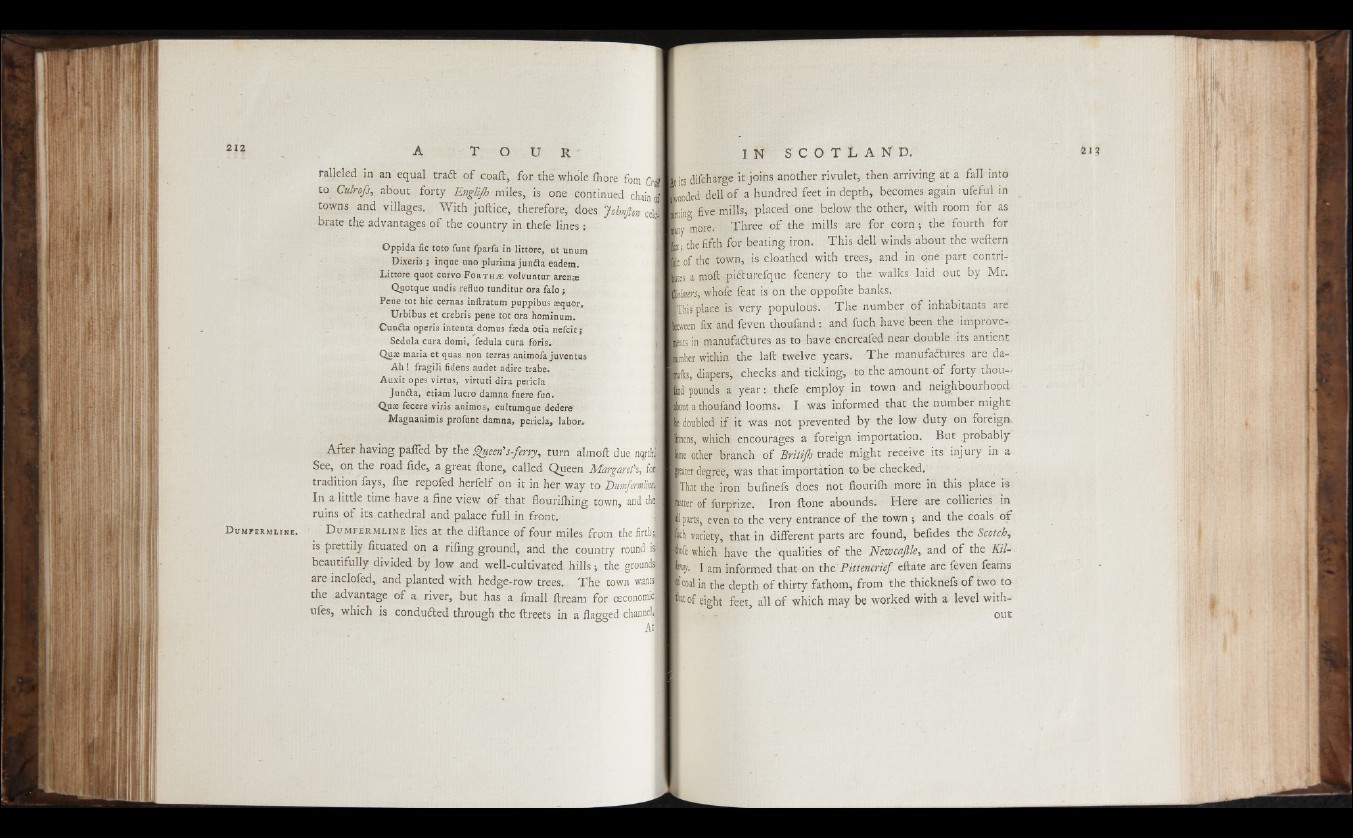
212
I
I l i i S i r
iB I imÌ S l i l t
l l l i i
D u m e e r m l in e .
a T O U R ■ I N S C O T L A N D .
raljeled in an equal traCt of coaft, for the whole ihore fnm r.J l . I AifcKar&e it ioins another rivulet, then arriving at a fall into
213
. M 'fom C:-jm its difcharge it joins
to Culrofs, about forty Englifh miles, is one continued chain f
towns and villages. With juftice, therefore, does
Johnfton cell
brate the advantages of the country in thefe lines:
Oppida fie toto Cunt fparfa in littore, ut unum
Dixeris ; inque uno plurima j unita eadem.
Littore quot curvo F o r t h v e volvuntur arena
Quotque undis refluo tunditur ora falo ;
Pene tot hie cernas inftratum puppibus aequor,
Urbibus et crebris pene tot ora hominum.
Cunita operis intenta domus fed a otia nefcit;
Seduta cura domi, fedula cura foris.
Q u a maria et quas non terras animofa juventus
Ah ! fra gili fidens audet adire trabe.
A u x it opes virtus, virtuti dira pericla
Junita, etiam lucro damna fuere fuo.
Q u a fecere viris animos, cultumque dedere
Magnanimis profunt damna, pericla, labor.
After having pafled by the Queen's-ferry, turn almoft due nqrtJ
See, on the road fide, a great ftone, called Queen Margaret's, fol
tradition fays, ihe repoièd herielf on it in her way to Duvnfemlit\
In a little time have a fine view of that flourilhing town, and till
ruins of its cathedral and palace full in front.
Dumfermline lies at the diftance of four miles from the iirtlil
is prettily fituated on a riling ground, and the country round i!
beautifully divided by low and well-cultivated hills ; the ground!
are incloled, and planted with hedge-row trees. The town want!
the advantage of a river, but has a fmall Itream for ceconomiJ
ufes, which is conducted through the ftreets in a flagged channel!
Atl
»ooded dell of a hundred feet in depth, becomes again ufeful in
„¡lib five mills, placed one below the other, with room for as
ny more; Three of the mills are for corn; the fourth for-
¡. the fifth for beating iron. This dell winds about the weftern
■ of the town, is cloathed with trees, and in one part contri-
!« a molt piCturefque fcenery to the walks laid out by Mr.
timers, whofe feat is on the oppofite banks.
This place is very populous. The number of inhabitants are
[ween fix and leven thoufand: and fuch have been the improver
s in manufactures as to have encreafed near double its antient
Lber within the laft twelve years. The manufactures are da-
L(ks, diapers, checks and ticking, to the amount of forty thou-
[d pounds a year: thefe employ in town and neighbourhood
[out a thoufand looms. I was informed that the number might
doubled if it was not prevented by the low duty on foreign,
lens, which encourages a foreign importation. But probably
|me other branch of Britifh trade might receive its injuiy in a
Biter degree, was that importation to be checked.
[That the iron bufinefs does not flouriih more in this place is.
Jitter of furprize. Iron ftone abounds. Here are collieries in
[l parts, even to the very entrance of the town ; and the coals of
|ch variety, that in different parts are found, befides the Scotch,
ft which have the qualities of the Newcaftle, and of the Kil-
I am informed that on the Pittencrief eftate are feven feams
f toal in the depth of thirty fathom, from the thicknefs of two to
|l$t eight feet, all of which may be worked with a level without